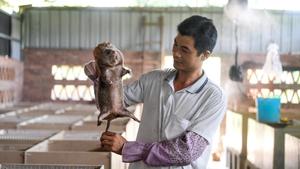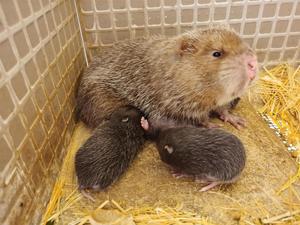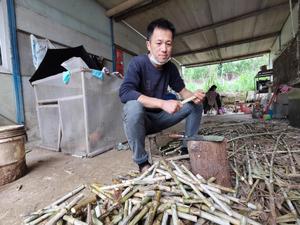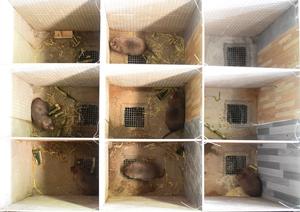Industry under threat as pandemic casts long shadow
 Lin Jinghong checks a bamboo rat raised at his farm in Qinzhou, Guangxi Zhuang autonomous region. Breeding the rodents has helped him and his fellow villagers eradicate poverty over the past five years. Lin's business now makes 100,000 yuan annually. (ZHANG AILIN / XINHUA)
Lin Jinghong checks a bamboo rat raised at his farm in Qinzhou, Guangxi Zhuang autonomous region. Breeding the rodents has helped him and his fellow villagers eradicate poverty over the past five years. Lin's business now makes 100,000 yuan annually. (ZHANG AILIN / XINHUA)
Su Lei is worried about the fate of his bamboo rats and the possibility of losing his livelihood.
He breeds more than 800 of the rodents, some 200 of which were born in the past four months. Their market value is over 160,000 yuan (US$22,400), and Su has also invested about 45,000 yuan on an 80-square-meter breeding site, with small, separate areas for the rats.
Since February, when China introduced a ban on eating and trading in wild animals due to the novel coronavirus outbreak, sales of bamboo rats have been suspended.
In April, public opinion was sought as the country announced a revised list of edible animal species. Bamboo rats were not on the list, along with snakes.
Breeders such as Su, who comes from Gongcheng Yao autonomous county in the Guangxi Zhuang autonomous region, are in a dilemma. They are still spending money on feeding the rodents, while awaiting a final decision on their business.
In mid-May, China's first provincial-level plan to clarify compensation awarded to wildlife breeders for the disposal of animals in captivity was launched in Hunan province.
The bamboo rat and the civet cat were among the first 14 species included in the plan, with bamboo rat breeders being paid 75 yuan a kilogram. Only those with valid breeding licenses are eligible for compensation.
The Guangxi government is still working on the details of compensation for the rat breeders.
 The rats feed mostly on coarse fiber such as bamboo and sugar cane. (SHI RUIPENG / CHINA DAILY)
The rats feed mostly on coarse fiber such as bamboo and sugar cane. (SHI RUIPENG / CHINA DAILY)
The region is one of the areas of the country with a high number of bamboo rat breeders, with the industry enabling people such as Su and counterparts in Hunan, Guizhou and Yunnan provinces to make a living.
The Gongcheng county government has launched a program to help those living below the poverty line build up capital-for example, by breeding bamboo rats. It offers free training and loans at a discount to set up such businesses.
Su traveled to several large cities as a migrant worker before returning to Gongcheng in 2012 to join the program after hearing from fellow villagers that rat breeding is lucrative. Since then, he has lifted himself out of poverty.
His initial income as a novice breeder was low. However, after acquiring the skills to breed the rodents, he now earns about 50,000 yuan a year. For rural farmers, this is much more profitable than raising pigs, chickens and growing crops.
Su has been granted a loan of 50,000 yuan under the government program. As he currently has no income due to sales of bamboo rats being suspended, he has borrowed an identical amount from relatives to cover his costs. He feeds the rats regularly and disinfects the breeding site three times a day.
The rats feed mostly on coarse fiber, such as bamboo and sugar cane, which are found widely in rural areas of southern China. Breeders add other ingredients to ensure the correct nutrition levels.
Su is worried that it will be hard for him to find another job, as the COVID-19 pandemic has affected many industries.
"Due to my limited education, I used to do manual work. If I can't raise bamboo rats, I don't know what else I can do. I may become destitute again," he said.
 The rats feed mostly on coarse fiber such as bamboo and sugar cane. (SHI RUIPENG / CHINA DAILY)
The rats feed mostly on coarse fiber such as bamboo and sugar cane. (SHI RUIPENG / CHINA DAILY)
Cooperatives urged
Long Yichun, from Gongcheng, who owns a cooperative that buys bamboo rats from breeders and trades them with others, said: "The cost of feed is a burden for breeders, especially those who have loans. With no income during this period, you have no time to do other things because you're preoccupied with the rodents."
The local government encouraged such cooperatives to be set up to help people establish businesses.
Long has 2,000 of the rodents, and it costs him 14,500 yuan a month to feed them and employ two workers.
"Many breeders grow bamboo or sugar cane to feed the rats. If they are forced to switch jobs-for example, to grow crops-they will find such work difficult, as it requires digging up deeply embedded roots," he said.
He added that it takes about three years for a breeder to recover his or her initial outlay. In the second year, many breeders take out loans to expand their businesses.
"Those with loans who have recently escaped from poverty, or are still living under the poverty line, will be hit hard if the industry dies. Some companies have invested much more than individuals, with such sums reaching several million yuan," he said.
"For breeders, our only wish is that the compensation paid is reasonable, to reduce losses as much as possible."
 The rats feed mostly on coarse fiber such as bamboo and sugar cane. (SHI RUIPENG / CHINA DAILY)
The rats feed mostly on coarse fiber such as bamboo and sugar cane. (SHI RUIPENG / CHINA DAILY)
Liu Kejun, a senior livestock engineer at the Animal Husbandry Research Institute in Guangxi, estimates there are some 36 million bamboo rats in captivity in the region. With an annual output worth 2.8 billion yuan, the industry in Guangxi employs 182,000 people, including some 19 percent living under the poverty line or who have recently escaped poverty.
The bamboo rat breeding industry in China started in the 1980s, and has expanded significantly since 2010, Liu said.
"In recent years, governments in areas such as Guangxi, Guizhou, Yunnan and Hunan have found the industry a fast and efficient way to shake off poverty. By being offered preferential policies, migrant workers are attracted to return home to join the industry," said Liu, who started to research bamboo rat breeding in the 1990s.
He said the rat meat is popular in some areas, and breeders don't place additives or antibiotics in the rodents' feed. The meat sells for 140 yuan per kilogram in Guangxi-much more expensive than beef.
No vaccines for the rodents are available to prevent common diseases, Liu said, but unlike chickens and ducks for example, bamboo rats rarely fall ill and do not have zoonosis, a disease which can be transmitted to humans from animals.
However, based on his experience, bamboo rats may have some respiratory or enteric diseases. The latter are infections caused by viruses and bacteria that enter the body through the mouth or intestinal system.
 A breeder in Nanning, Guangxi, prepares sugar cane for his rats. (SHI RUIPENG / CHINA DAILY)
A breeder in Nanning, Guangxi, prepares sugar cane for his rats. (SHI RUIPENG / CHINA DAILY)
In 2016 and last year, the Guangxi government introduced a series of standards for breeding bamboo rats. Some provinces have also set their own standards.
Last year, a proposal to establish a quarantine standard for bamboo rats was submitted to the Guangxi government by a professional institution. However, the proposal had not been approved, Liu said.
"The proposal was supposed to be resubmitted this year, but then the COVID-19 outbreak emerged," he added.
Liu estimates that with the joint efforts of a number of government departments, it will take one or two years to implement such a standard-as long as the proposal is approved.
"If this industry has to end, the compensation paid should be reasonable, as this will impact greatly on those who have recently escaped poverty or are still living under the poverty line," Liu said.
He added that about one-third of those in the industry have no permits, and it is likely that only workers with such documentation will receive compensation.
"Some breeders, especially those who are impoverished, only raise a small number of the rodents, and it's difficult to apply for permits on such a small scale. That's why they need to trade with local cooperatives," Liu said.
 Lin Jinghong's rat farm. (ZHANG AILIN / XINHUA)
Lin Jinghong's rat farm. (ZHANG AILIN / XINHUA)
Essential livelihood
Lyu Zhi, a professor of life sciences at Peking University, said, "If they rely solely on local public finances, breeders may not be given sufficient compensation, so the key is to get financial support from the central government."
In late January, Lyu was one of 19 Chinese scholars who jointly published an online appeal seeking the eradication of the illegal trade in and consumption of wild animals.
She suggested that the national poverty alleviation fund should give priority to breeders greatly affected by the pandemic, or that the central government could offer an annual subsidy, instead of a lump sum.
As an example, Lyu said that when the central government introduced a logging ban in natural forests in 1998, it introduced an annual subsidy for the individuals and forestry centers affected.
She said that in some areas of China, wildlife breeding and related trade is essential for farmers and small companies to survive, and the government should help them switch to other professions if the industry dies.
 Zhang Wenming, president of the Nanning Bamboo Rat Breeding Association, inspects areas for the rodents at his farm. (SHI RUIPENG / CHINA DAILY)
Zhang Wenming, president of the Nanning Bamboo Rat Breeding Association, inspects areas for the rodents at his farm. (SHI RUIPENG / CHINA DAILY)
Amanda E. Fine, associate director, Asia, for the Wildlife Health Program at the Wildlife Conservation Society, said: "Viruses known to cause severe disease in humans have been found in rodents, including bamboo rats. Some of these viruses are in the coronavirus family.
"Investigations of coronaviruses circulating on bamboo rat farms are underway to help us understand the risk of a virus spilling over on such farms."
She said commercial breeding facilities for bamboo rats are not enclosed areas, adding that there is always the risk of a virus being transmitted through the movement of animals, no matter how clean or efficiently managed a facility is.
"The emergence of a new pathogen is a rare event, but the spillover of viruses is now more common. Any increased opportunity for a virus to spill over from wildlife species, especially those raised commercially in close proximity to humans and consumed by them, represents an increased risk of such an event leading to the emergence of a new human pathogen," Fine said.
Contact the writers at xulin@chinadaily.com.cn


